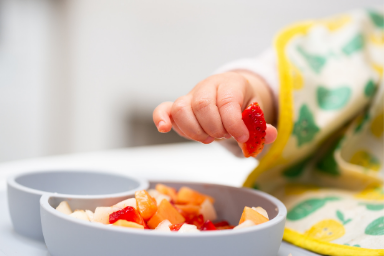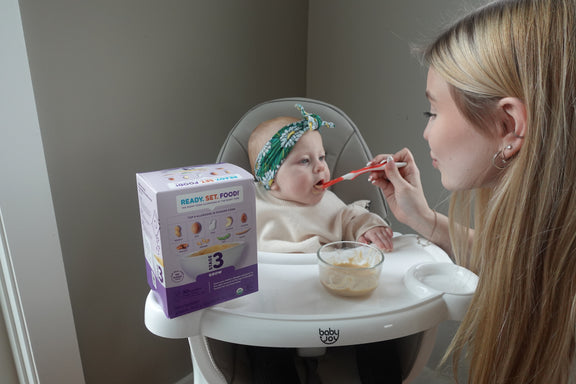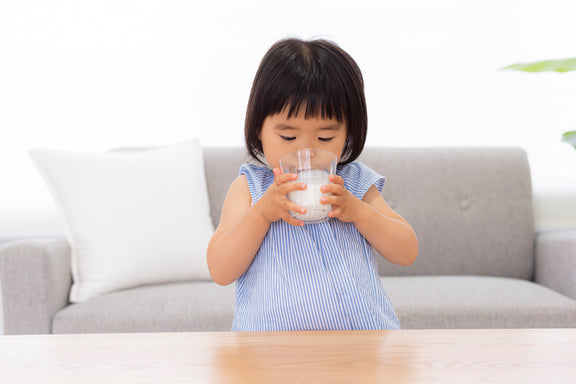When to wean baby off formula, how to do this, and what should baby be drinking (and eating) after they transition off of the formula? We’ll cover all the answers for parents here.
It’s been months since you first chose the right formula for your little one, and you’ve settled into a preparing and feeding routine. It almost feels like you’ve been doing this forever.
But as baby starts their solid food journey and is drinking less formula, you’re probably wondering when you should wean – when baby should stop drinking formula.
When to wean baby off formula, how to do this, and what should baby be drinking (and eating) instead? We’ll cover all the answers for parents here.
When to wean baby off formula?
If you’ve started giving baby solid foods, you’ve actually started the weaning process already. That’s because weaning begins when baby eats anything other than formula (or breastmilk).
Baby will usually be ready for solids between 4 and 6 months of age.
But even when baby is eating solids, they can’t be totally weaned off of formula for several more months.
Baby will start to drink less formula as solids fill up spaces in their diet. They’ll still need to continue to drink formula, though, until they’ve reached their first birthday.
In addition to the healthy solids they’re trying, a 9-12 month old baby will usually need between 20 and 32 ounces of formula per day.
That’s because formula (just like breastmilk) contains the essential nutrients that baby needs to thrive in their first year. And no other food or beverage can match that nutritional value for babies under one.
Once baby is one year old, though, you can start to think about transitioning them off of formula completely.
When is baby ready to completely stop drinking formula?
Baby needs to be one year old before they can stop drinking formula.
But they’ll need to meet other criteria, too.
- They should be eating a balanced diet of many healthy solids (fruits, veggies, proteins, and whole grains)
- They should be gaining weight well
- They should be a full-term baby (If baby was born prematurely, talk to your doctor. Your doctor may recommend keeping baby on formula until 12 months after baby’s original due date.)
- They should not have any other doctor-recommended reasons to stay on formula longer, such as a food allergy, digestive condition, or other condition that requires a special diet.
Has baby met all those criteria? That doesn’t mean you should immediately stop mixing up the formula.
You don’t need to rush to stop formula feeding right away once baby celebrates their first birthday.
A gradual transition off formula is often best. This simply means giving more solids and less formula, just like you started doing before age one.
Your child should reach the milestone of eating mostly solids – or all solids – between their first birthday and second birthday.
Healthy solids at age one
When baby is one, a healthy and age-appropriate diet of solids will provide all the nutrients they need – especially after they’re done with formula. What should your little one be eating when it’s time to transition off of formula?
Here’s what the U.S. Department of Agriculture (USDA) recommends in their dietary guidelines for toddlers 1-2 years of age:
- A diverse mix of fruits and vegetables, in many colors (these take priority)
- Different types of proteins, like eggs, meat, fish, other seafood, safe nut products, and seed products
- Whole grains
- Dairy products, like yogurt and cheese
- Foods with no added sugar
- Foods low in sodium
What drink(s) should your little one have when they stop drinking formula?
We’ve covered the healthy solids that baby should be eating as you transition them off of formula. But what should you give baby to drink?
After age one, baby is ready to start drinking cow’s milk – which is the best drink to use for weaning off of formula (assuming baby is not allergic).
If baby is allergic to cow’s milk, talk to your pediatrician or allergist about the best drink to transition to when weaning off of formula.
As the Centers for Disease Control and Prevention (CDC) advises, "If you and your child have decided it is time to wean and your child is 12 months or older: Give your child plain whole cow’s milk... He or she does not need… toddler milks, toddler drinks, or toddler formula."
Water is another healthy drink to replace formula with. It helps build healthy habits, so your child stays hydrated and stays away from sugary drinks. The only two drinks your little one should have in their second year – once they stop having formula – are plain cow’s milk and water.
While you may have heard of “toddler formulas” as a way to transition off infant formula, they aren’t the best option. “Toddler formulas” are over-sweetened with sugars, and are more expensive than standard cow’s milk. Plus, they aren’t reliable nutritional sources, because they don’t have to contain the balanced sets of nutrients like infant formula does. Cow’s milk and water are much better choices!
What kind of cow’s milk should I give?
For almost all children ages 1-2, plain (unflavored) whole cow’s milk is recommended by the experts, including the CDC and American Academy of Pediatrics (AAP).
The extra fat in whole milk helps promote your little one’s growth and brain health, and encourages their body to absorb Vitamin A and Vitamin D.
Learn more tips for weaning baby and transitioning to cow’s milk from Dr. Mona:
Only use a lower-fat milk instead of whole milk if that’s what your doctor recommends.
How to transition from formula using cow’s milk?
You can use cow’s milk to gradually replace formula once baby turns one and you’re ready to complete the weaning.
There are two main ways to use cow’s milk to fully transition baby off formula:
- Replacing some of the formula servings with cow’s milk servings, and gradually adding in more milk daily
- Mixing some cow’s milk with prepared formula, and gradually reducing the amount of prepared formula in the mix
Both ways are recommended by Radhai Prabhakaran, MD, a pediatrician at the Cleveland Clinic.
The first method (adding in servings of cow’s milk by itself) works well if you see that baby enjoys the milk’s taste.
- Offer 2-4 ounces of cow’s milk for every formula serving your little one currently eats. Try offering some of the milk alongside your little one’s meals!
- Over the next 7-10 days, gradually replace more of baby’s usual formula intake with milk.
- Once baby drinks the milk willingly, stop giving formula.
The second method (mixing milk with prepared formula) is best if baby prefers the formula taste.
It’s safe to mix prepared formula with cow’s milk, but you must prepare it first. NEVER mix formula powder with whole milk– only use water.
- Prepare formula as normal. Then, mix 2 ounces of the prepared formula with 2 ounces of cow’s milk.
- Feed baby this 4-ounce blend every time they would normally have formula.
- Over the next 7-10 days, gradually add more cow’s milk and less formula to each 4-ounce serving.
- At the end of this week or week and a half, baby will be drinking all cow’s milk and no formula.
You can also try a more gradual method, where you replace 1 ounce of formula with 1 ounce of milk at a time.
Or, try replacing a quarter of the formula baby eats with milk every 2-3 days. This could look like:
- Days 1-3: ¼ milk, ¾ formula
- Days 4-6: ½ milk, ½ formula
- Days 7-9: ¾ milk, ¼ formula
- Day 10: Fully transitioned to milk, no formula
During or shortly after transitioning from formula to cow’s milk is a great time to transition your little one off the bottle, too. Learn why it’s important to transition from the bottle to a cup around age 1.
How much milk should my 1-2 year old have per day?
The American Academy of Pediatrics (AAP) recommends that 1-2 year olds drink 16-24 ounces of milk per day, which comes out to 2-3 cups.
Still, even when transitioning off of formula, it’s best not to give your little one more than 2 ½ cups (20 ounces) of milk total per day. More than that could lessen baby’s appetite for those all-important solids.
Never give your toddler more than 24 ounces of milk per day, the upper limit that the American Academy of Pediatrics (AAP) recommends for 1-2 year olds.
This applies whether you’re currently transitioning from formula to cow’s milk, or whether baby is done with formula.
Remember: milk is just a drink that supplements solids, not a whole meal like formula was. At some point in the second year, milk should only be offered with meals. And as they grow, your little one will naturally drink less milk as they eat more solids.

The Window Of Opportunity For Introducing Peanut: New Study Findings From the LEAP and EAT Trials
Results from the landmark LEAP and EAT studies have shown that intr...

Best Finger Foods For Babies (And When To Start Finger Foods)
When to move beyond the spoon and start baby's journey with finger ...

6 Reasons Why You Should Introduce Allergens
Landmark studies and medical guidelines recommend that you introduc...

7 Ways to Feed Your Toddler More Iron
Iron is an essential mineral for your toddler’s brain health and ov...

How To Know If My Toddler Is Getting Enough Protein?
Protein supports your toddler’s growth, helps build strong bones an...

How Much Milk Should Your Toddler Drink?
How much milk should your toddler drink in a day? Find out the reco...
All health-related content on this website is for informational purposes only and does not create a doctor-patient relationship. Always seek the advice of your own pediatrician in connection with any questions regarding your baby’s health.
These statements have not been evaluated by the Food and Drug Administration. Products are not intended to diagnose, treat, cure or prevent any disease. If your infant has severe eczema, check with your infant’s healthcare provider before feeding foods containing ground peanuts.







